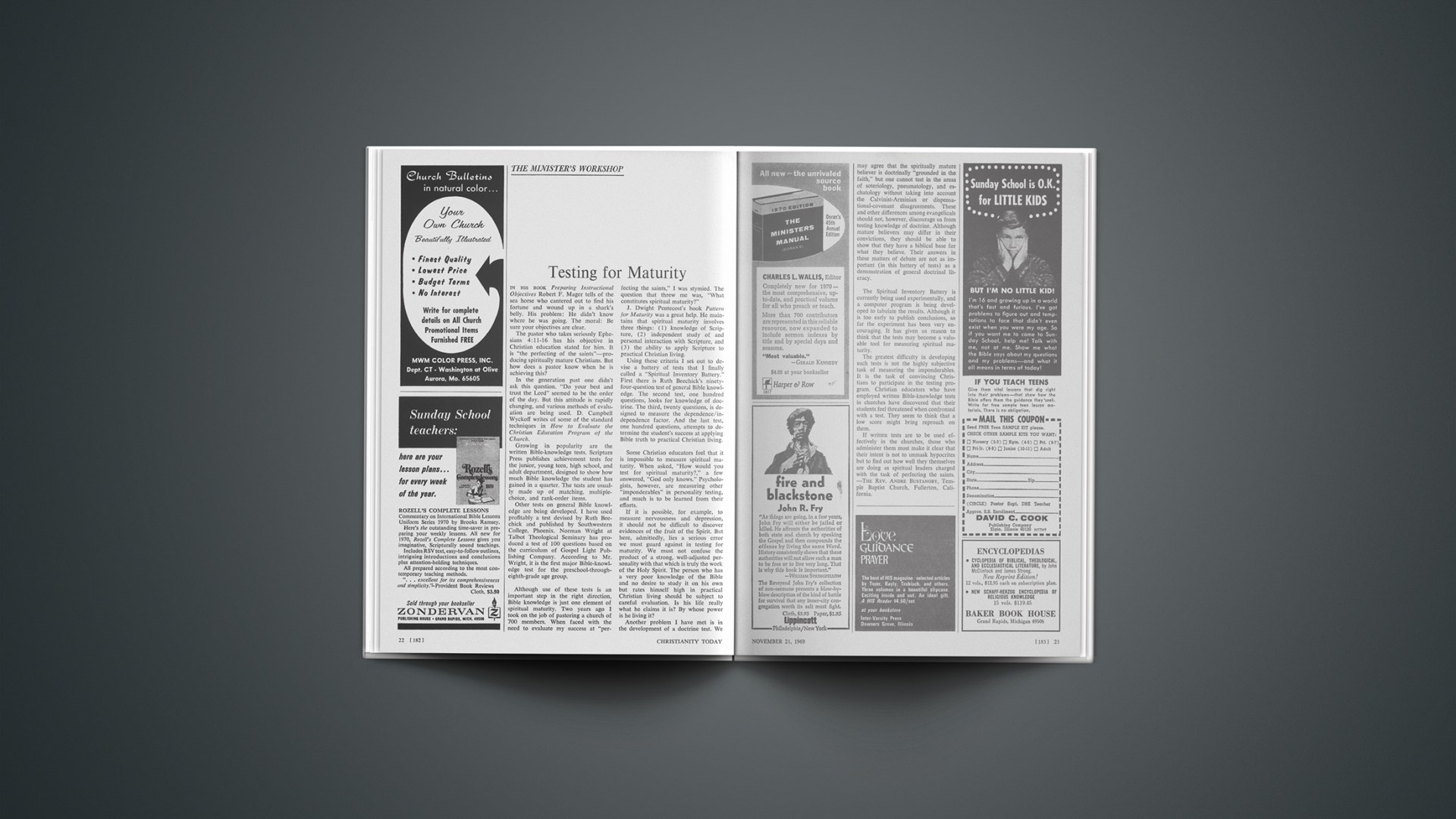In his book Preparing Instructional Objectives Robert F. Mager tells of the sea horse who cantered out to find his fortune and wound up in a shark’s belly. His problem: He didn’t know where he was going. The moral: Be sure your objectives are clear.
The pastor who takes seriously Ephesians 4:11–16 has his objective in Christian education stated for him. It is “the perfecting of the saints”—producing spiritually mature Christians. But how does a pastor know when he is achieving this?
In the generation past one didn’t ask this question. “Do your best and trust the Lord” seemed to be the order of the day. But this attitude is rapidly changing, and various methods of evaluation are being used. D. Campbell Wyckoff writes of some of the standard techniques in How to Evaluate the Christian Education Program of the Church.
Growing in popularity are the written Bible-knowledge tests. Scripture Press publishes achievement tests for the junior, young teen, high school, and adult department, designed to show how much Bible knowledge the student has gained in a quarter. The tests are usually made up of matching, multiple-choice, and rank-order items.
Other tests on general Bible knowledge are being developed. I have used profitably a test devised by Ruth Beechick and published by Southwestern College, Phoenix. Norman Wright at Talbot Theological Seminary has produced a test of 100 questions based on the curriculum of Gospel Light Publishing Company. According to Mr. Wright, it is the first major Bible-knowledge test for the preschool-through-eighth-grade age group.
Although use of these tests is an important step in the right direction, Bible knowledge is just one element of spiritual maturity. Two years ago I took on the job of pastoring a church of 700 members. When faced with the need to evaluate my success at “perfecting the saints,” I was stymied. The question that threw me was, “What constitutes spiritual maturity?”
J. Dwight Pentecost’s book Pattern for Maturity was a great help. He maintains that spiritual maturity involves three things: (1) knowledge of Scripture, (2) independent study of and personal interaction with Scripture, and (3) the ability to apply Scripture to practical Christian living.
Using these criteria I set out to devise a battery of tests that I finally called a “Spiritual Inventory Battery.” First there is Ruth Beechick’s ninety-four-question test of general Bible knowledge. The second test, one hundred questions, looks for knowledge of doctrine. The third, twenty questions, is designed to measure the dependence/independence factor. And the last test, one hundred questions, attempts to determine the student’s success at applying Bible truth to practical Christian living.
Some Christian educators feel that it is impossible to measure spiritual maturity. When asked, “How would you test for spiritual maturity?,” a few answered, “God only knows.” Psychologists, however, are measuring other “imponderables” in personality testing, and much is to be learned from their efforts.
If it is possible, for example, to measure nervousness and depression, it should not be difficult to discover evidences of the fruit of the Spirit. But here, admittedly, lies a serious error we must guard against in testing for maturity. We must not confuse the product of a strong, well-adjusted personality with that which is truly the work of the Holy Spirit. The person who has a very poor knowledge of the Bible and no desire to study it on his own but rates himself high in practical Christian living should be subject to careful evaluation. Is his life really what he claims it is? By whose power is he living it?
Another problem I have met is in the development of a doctrine test. We may agree that the spiritually mature believer is doctrinally “grounded in the faith,” but one cannot test in the areas of soteriology, pneumatology, and eschatology without taking into account the Calvinist-Arminian or dispensational-covenant disagreements. These and other differences among evangelicals should not, however, discourage us from testing knowledge of doctrine. Although mature believers may differ in their convictions, they should be able to show that they have a biblical base for what they believe. Their answers in these matters of debate are not as important (in this battery of tests) as a demonstration of general doctrinal literacy.
The Spiritual Inventory Battery is currently being used experimentally, and a computer program is being developed to tabulate the results. Although it is too early to publish conclusions, so far the experiment has been very encouraging. It has given us reason to think that the tests may become a valuable tool for measuring spiritual maturity.
The greatest difficulty in developing such tests is not the highly subjective task of measuring the imponderables. It is the task of convincing Christians to participate in the testing program. Christian educators who have employed written Bible-knowledge tests in churches have discovered that their students feel threatened when confronted with a test. They seem to think that a low score might bring reproach on them.
If written tests are to be used effectively in the churches, those who administer them must make it clear that their intent is not to unmask hypocrites but to find out how well they themselves are doing as spiritual leaders charged with the task of perfecting the saints.
—THE REV. ANDRE BUSTANOBY, Temple Baptist Church, Fullerton, California.










